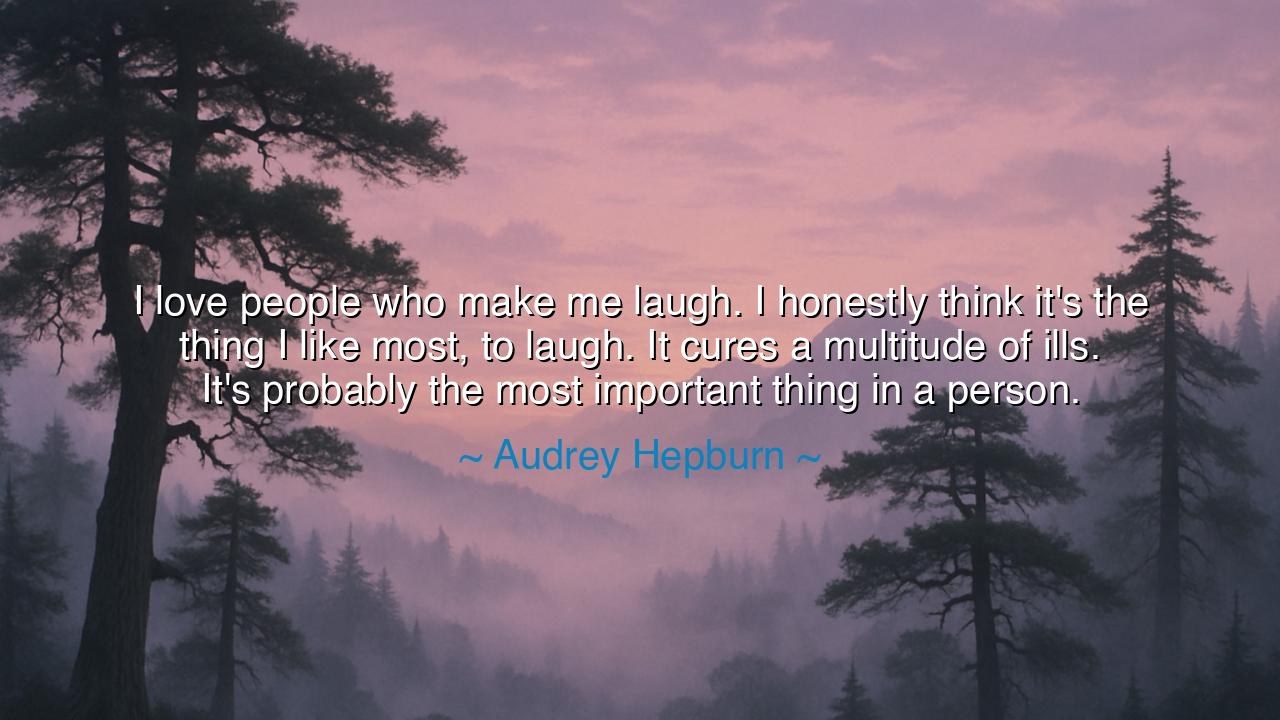
I love people who make me laugh. I honestly think it's the thing
I love people who make me laugh. I honestly think it's the thing I like most, to laugh. It cures a multitude of ills. It's probably the most important thing in a person.






“I love people who make me laugh. I honestly think it's the thing I like most, to laugh. It cures a multitude of ills. It's probably the most important thing in a person.” So spoke Audrey Hepburn, the graceful spirit whose beauty was not only in her form, but in her soul. In these gentle yet profound words, she revealed a truth as old as humanity — that laughter is not merely a sound, but a medicine of the spirit, a divine force that restores, uplifts, and binds the wounded heart to life again. Her words are simple, yet behind them stands the full wisdom of one who had known both sorrow and radiance, and who chose joy as her act of courage.
In the ancient manner, let us begin with reverence for laughter itself. The sages once said that laughter is the music of the gods, given to mortals so that they might bear the weight of existence. It is the sunlight that penetrates despair; it is the air that the weary breathe when they have forgotten how to hope. Hepburn understood this deeply. She lived through war, through hunger, through the loss of her father and the ruins of her homeland. Yet she emerged not bitter, but luminous. The laughter she spoke of was not the laughter of shallow delight — it was the laughter born of resilience, of the soul’s refusal to surrender to darkness.
To laugh, truly laugh, is to declare one’s freedom from the grip of suffering. It is to look upon the chaos of the world and still say, “I choose joy.” This is why Hepburn called it a cure for “a multitude of ills.” For laughter loosens the knots of fear; it melts the frost of loneliness; it restores the heartbeat of faith. Doctors may heal the body, but laughter, that sacred force, heals the unseen fractures of the heart. Those who laugh together share a bond beyond words — they speak the secret language of light.
Consider the story of Charlie Chaplin, whose life mirrored this truth. Born in poverty, abandoned and alone, he turned his suffering into laughter for the world. Through his art, he transformed tears into smiles, showing that laughter is not the denial of pain, but its transcendence. When the people of the Great Depression sat in darkness, it was Chaplin’s silent grin that gave them strength. He did not erase their troubles — he reminded them of their humanity. This is what Hepburn meant when she said laughter “cures” — for it awakens the divine within us, the part that still dares to find beauty amid sorrow.
In the eyes of Hepburn, laughter was also the truest measure of character. “It’s probably the most important thing in a person,” she said, not because it is frivolous, but because it reveals the heart. A person who can laugh easily, who can bring joy to others, carries within them a light that no hardship can extinguish. The humorless man, no matter his wisdom, cannot heal. The laughing one — even if poor, even if flawed — carries the spirit of kindness and hope. For laughter is not the enemy of seriousness; it is the companion of grace.
The ancients taught that laughter purifies the soul. The Stoics saw it as the victory of reason over despair. The mystics saw it as the echo of divine joy within mortal flesh. And so it is: laughter makes us more human, and in being human, we draw nearer to the gods. When we laugh, we remember that life, for all its sorrow, is still a gift; that even pain cannot rob us of the capacity to rejoice. In laughter, we practice the art of forgiveness — of ourselves, of others, of the world.
So, my children, take Hepburn’s words as a lamp for your own path. Cherish those who make you laugh, for they are healers in disguise. Be one who makes others laugh, not by mockery, but by warmth. When the storms of life rage, do not forget to smile — even a small smile can part the clouds. Seek laughter as you would seek wisdom; protect it as you would protect love. For in laughter lies the seed of healing, the whisper of eternity, and the proof that no darkness can wholly conquer the human heart.
Remember this, then: the world may wound, time may tire, but laughter endures. It is the soul’s rebellion against despair and the sign of its immortality. As Audrey Hepburn knew, those who can still laugh, even through tears, have already triumphed over sorrow. Let your laughter be your prayer, your shield, and your offering — for in the sound of it, the universe itself remembers to hope.






AAdministratorAdministrator
Welcome, honored guests. Please leave a comment, we will respond soon